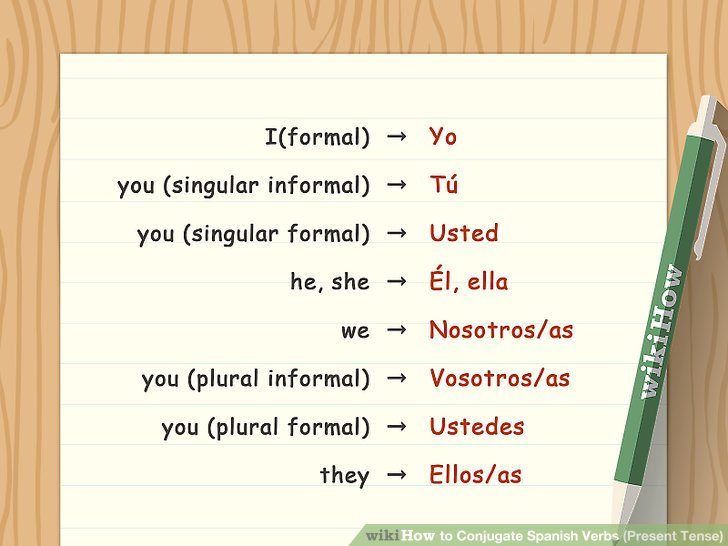Click to see all conjugation charts of querer in every tense
In this conjugation lesson we will learn how to conjugate the verb querer in the Presente tense of the Indicativo mood. It means we will see step by step how to create and translate forms of each grammatical person.
This lesson is specifically about the querer verb conjugation. For a general overview of all the Simple Tenses conjugation check our Simple Tenses Conjugation Chart.
We also have a Video Presentation on how to conjugate verbs in Presente. It’s embedded below, but using the above link you can see additional information on conjugation in this tense and explanation of special cases and exceptions.
How to translate Presente to English
Notice that the English phrases provided below next to each conjugation are not direct translations from Spanish to English. They are usually the closest general equivalents. The example differences are:- In Spanish conjugation, there is the form usted in the third person singular. But this person does not translate to the English third person singular. It translates to the so called formal you and uses the inflected form which is most often represented as he/she/it in English conjugation charts.
- Similar situation happens in the third person plural, where ustedes translates to the English plural formal you but uses the form which corresponds to the they form in English.
- Tenses are used differently in Spanish and English, so the actual translation should always take into account the context and focus on translating the meaning, not just words.
- In both languages each verb may have multiple meanings and not every meaning translates directly to the other language. Here also, the context and focusing on the particular meaning helps to create the most accurate translation.
The Spanish Presente de Indicativo tense translates to one of the following:
- The English Present tense, for instance: ellos quierenthey want
- The English Present Progressive (a.k.a. Present Continuous) tense, for example:hoy vosotros queréis(plural) you are wanting today
Notice however, that the Spanish equivalent of the Present Progressive also exists and is in common use – that’s Presente Progresivo (a.k.a. Presente Continuo).
Note the timeline
The ability to accurately locate the intended position on the timeline is a crucial skill for the right choice of tenses. So pay attention to the timeline in our lessons and visualize it while speaking, listening, writing and reading. After some practice you will be capable of selecting the right tense to use much easier.
Step by step instructions
Presente belongs to the simple tenses group, which means that all of its inflected forms are one word long. There are also compound (compuesto) tenses in Spanish language, where each inflected verb form consists of two words. The verb querer has an irregular conjugation in the Presente tense of the Indicativo mood. The first person singular has an irregular stem in this tense.This verb belongs to the group which gets a change of the last e in the stem into an ie.
It’s convenient to think about this change as happening only in Presente de Indicativo, persons 1st, 2nd, 3rd singular and 3rd plural. It never gets beyond these grammatical persons in the tenses it influences, that is:
- Presente de Subjuntivo
- Imperativo Afirmativo & Negativo
The 1st person singular may also be entirely irregular here, and in such case it doesn’t follow this model. And when the first person of the Present tense is irregular, all the above mentioned tenses which normally use the 3rd person’s form as the basis of their conjugation, switch to using the 1st person’s form.
So in the regular stem quer change e to ie to get quier. But at least the ending is regular for this person. It is -o as normally in the -er verb group. Add it to the stem to get:
- yo quiero – I want
So as explained before we need to change e to ie in the regular stem quer to get quier. Again the ending is regular for this person. It is -es as normally in the -er verb group. Add it to the stem to get:
- tú quieres – you want
So as explained earlier we need to change e to ie in the regular stem quer to get quier. And again the ending is regular for this person. It is -e as normally in the -er verb group. Add it to the stem to get:
- él quiere – he wants
- ella quiere – she wants
- usted quiere – (formal) you want
- nosotros queremos – we want
- nosotras queremos – (feminine) we want
- vosotros queréis – (plural) you want
- vosotras queréis – (feminine, plural) you want
So as explained earlier we need to change e to ie in the regular stem quer to get quier. And the ending is regular for this person. It is -en as normally in the -er verb group. Add it to the stem to get:
- ellos quieren – they want
- ellas quieren – (feminine) they want
- ustedes quieren – (formal, plural) you want
Hurray! The conjugation is now finished. The final result looks as follows:
| yo | quiero | I want |
| tú | quieres | you want |
| él/ella/usted | quiere | he/she/it wants |
| nosotros/nosotras | queremos | we want |
| vosotros/vosotras | queréis | you want |
| ellos/ellas/ustedes | quieren | they want |
But do not end your session yet – it is very important to repeat and practice the material in order to remember it. Check below for examples and some links.
Example sentences
Si quieres cambiar el mundo, cámbiate a ti mismo.
If you want to change the world, change yourself.
No quiero ir a ninguna parte con ella porque está pesada.
I don't want to go anywhere with her because she's being annoying.
Siempre hiero a los que más quiero.
I always hurt those I love the most.
Como ella no quiere que yo le ayude, me marcho.
As she doesn't want me to help her, I'm leaving.
La gente quiere que haya más trabajo.
People wish there was more work.
¿Quieres entrar y conocer a algunos de mis compañeros de trabajo?
Do you want to come and meet some of my co-workers?
Quiero hablar contigo, pero me pongo nervioso cada vez que lo intento.
I want to talk to you, but I get nervous every time I try.
Si quieres evitar problemas, no desobedezcas las reglas de la escuela.
If you want to avoid problems, do not disobey the rules of the school.
Ya no quiero esta ventana, úsala tú, puedes ver un lindo paisaje.
I do not want this window anymore, you use it, you can see a beautiful landscape.
No quieren que hables de los problemas del sistema de votación.
They do not want you to talk about the problems of the voting system.
Next Steps to Perfection
|
Report a mistake | Give feedback
Thank you very much for making the effort to contact us!
We strive to provide the highest quality content and we greatly appreciate even the smallest suggestions:
We strive to provide the highest quality content and we greatly appreciate even the smallest suggestions:


